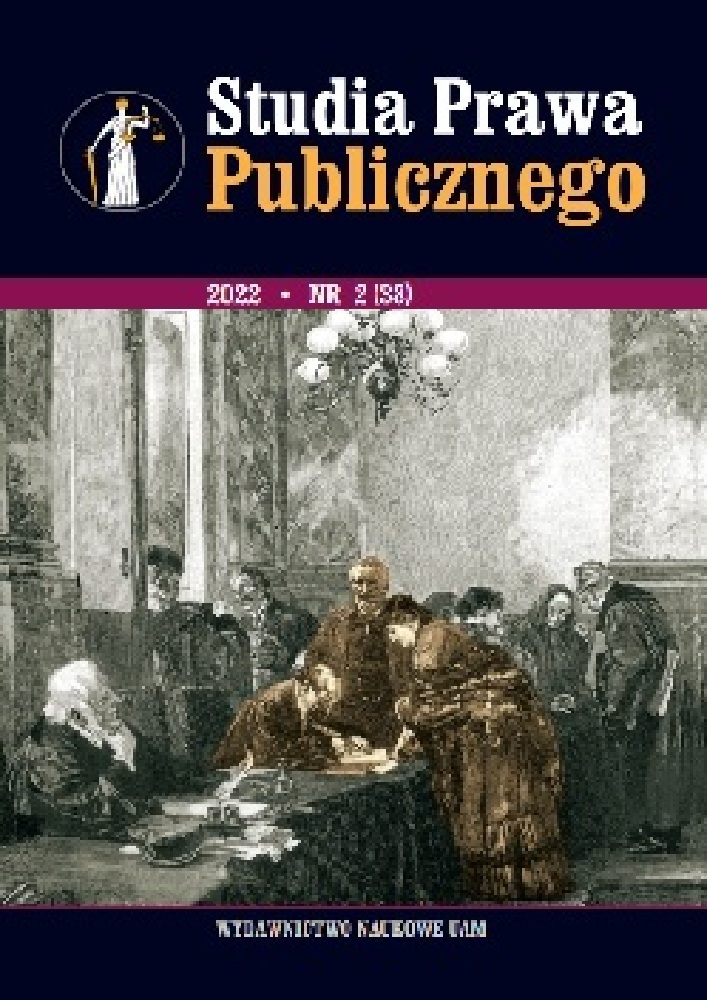Abstract
This article deals with the issue of securing the performance of the content of an administrative-legal relationship. The purpose of the discussion is to indicate what measures are provided for in the normative acts, as well as what measures are postulated in the doctrine. The article discusses the differences and similarities between the legal means of securing the performance of public-law obligations, as well as recognizing the basic problems that can be encountered when using these instruments and when assessing their effectiveness and efficiency. Administration is faced with a huge number of tasks. They are carried out in various legal forms, often there are imperative forms. The effect of the administra-tion’s actions are then orders and prohibitions of specific behavior addressed to those administrated. They result from administrative acts or normative acts. The state implements its goals and tasks primarily by means of administrative and legal orders and prohibitions, in order for them to be really effective, they must be secured by coercion or sanctions. In public law, the application of legal regulations results from the will of the competent state authorities, and the addressees of the actions of these entities cannot protect themselves from the consequences (consequences) of their adoption or violation. The multiplicity of these instruments is not an obstacle to achieving the goal of safeguarding compliance with administrative law; on the contrary, their richness makes the system more flexible and facilitates the choice of the best measure to se-cure the norm, and on the other hand, to be proportionate and fair in its application. The analysis of the legal problems is preceded by an explanation of the key terms: “administrative-legal relationship”, “administrative sanction” and “administrative lia-bility”, which allow the purpose and functions of individual legal instruments to be described. The article also discusses the objectives of administrative enforcement and administrative sanctions, as well as the problem of compliance of administrative sanctions with the Constitution of the Republic of Poland and international acts.
References
Adamiak B., Środki egzekucyjne, w: B. Adamiak, J. Borkowski, Polskie postępowanie administracyjne i sądowoadministracyjne, Warszawa 2000.
Andreoni J., Reasonable doubt and the optimal magnitude of fines: Should the penalty fit the crime?, „The RAND Journal of Economics” 1991, vol. 22(3).
Boć J., Prawo administracyjne, Wrocław 2005.
Cebera A., Podział na prawo publiczne i prywatne – informacje ogólne, w: Odpowiedzialność odszkodowawcza za niezgodne z prawem działania organów administracji publicznej, Warszawa 2018.
Dawidowicz W., Polskie prawo administracyjne, Warszawa 1960.
Dawidowicz W., Zarys procesu administracyjnego, Warszawa 1989.
Desmet P.T.M., Weber F., Infringers’ willingness to pay compensation versus fines, „European Journal of Law and Economics” 2022, vol. 53.
Filipek J., Elementy strukturalne norm prawa administracyjnego, Warszawa 1982.
FeldmanHall O., Sokol-Hessner P., Van Bavel J.J., Phelps E.A., Fairness violations elicit greater punishment on behalf of another than for oneself, „Nature Communications” 2014, no. 5.
Gajewski S., Kodeks postępowania administracyjnego. Komentarz, Warszawa 2017.
Hauser R., Stosunek administracyjnoprawny, w: Instytucje prawa administracyjnego. System prawa administracyjnego. Tom 1, pod red. R. Hausera, Z.K. Niewiadomskiego, A. Wróbla, Warszawa 2016.
Iserzon E., Prawo administracyjne, Warszawa 1970.
Janku Z., Gwarancje prawne wykonywania obowiązków publicznoprawnych, w: Koncepcja systemu prawa administracyjnego, pod red. J. Zimmermanna, Warszawa 2007.
Jendrośka J., Polskie postępowanie administracyjne, Wrocław 2009.
Kasznica S., Polskie prawo administracyjne: pojęcia i instytucje zasadnicze, Warszawa 1946.
Kędziora R., Kodeks postępowania administracyjnego. Komentarz, Warszawa 2017.
Kijowski D.R., Geneza i ewolucja środków przymusu, w: System prawa administracyjnego procesowego, Tom. III. Część 1. Administracyjne postępowanie egzekucyjne i zabezpieczające, pod red. G. Łaszczycy, A. Matana, D.R. Kijowskiego, Warszawa 2020.
Krawczyk A., Art. 189f, w: Kodeks postępowania administracyjnego. Komentarz, pod red. W. Chróścielewskiego, Z. Kmieciaka, Warszawa 2019, SIP LEX.
Lang J., Środki obrony, w: System egzekucji administracyjnej, pod red. J. Niczyporuka, S. Fundowicza, J. Radwanowicz, Warszawa 2000.
Leoński Z., O istocie kar administracyjnych, w: Jednostka w demokratycznym państwie prawa, pod red. J. Filipka, Bielsko-Biała 2003.
Leoński Z., Zarys prawa administracyjnego, Warszawa 2004.
Levitt S.D., Understanding why crime fell in the 1990s: Four factors that explain the decline and six that do not, „Journal of Economic Perspectives” 2004, vol. 18(1).
Longchamps F., O pojęciu stosunku prawnego w prawie administracyjnym, „Acta Univeristatis Wratislaviensis. Prawo” 1964, nr 12.
Majczak P., Uwagi na tle kodeksowej regulacji kar administracyjnych, „Acta Univeristatis Wratislaviensis” 2017, nr 3798, PRAWO CCCXXIII.
Peretiatkowicz A., Podstawowe pojęcia prawa administracyjnego, Poznań 1946.
Piątek W., Skoczylas A., Postępowanie egzekucyjne w administracji, w: Prawo procesowe administracyjne. System prawa administracyjnego, Tom 9, pod red. R. Hausera, Z.K. Niewiadomskiego, A. Wróbla, Warszawa 2019.
Skoczylas A., Postępowanie egzekucyjne w administracji, w: Prawo procesowe administracyjne. System prawa administracyjnego. Tom 9, pod red. R. Hausera, Z. Niewiadomskiego, A. Wróbla, Warszawa 2014.
Smoktunowicz E., Egzekucja administracyjna i sądowa, Warszawa 1995.
Starościak J., Podstawowe zagadnienia postępowania administracyjnego, Warszawa 1955.
Suwaj R., Zasady nakładania administracyjnych kar pieniężnych, Warszawa 2021.
Szreniawski P., Etyczne aspekty egzekucji administracyjnej, w: System Egzekucji Administracyjnej, pod red. J. Niczyporuka, S. Fundowicza, J. Radwanowicz, Warszawa 2004.
Weyembergh A., Joncheray N., Punitive Administrative Sanctions and Procedural Safeguards: A Blurred Picture That Needs to Be Addressed, „New Journal of European Criminal Law” 2016, no. 1.
Wronkowska S., Podstawowe pojęcia prawa i prawoznawstwa, Poznań 2005.
Wróbel A., Art.189a, w: A. Wróbel, M. Jaśkowska, Kodeks postępowania administracyjnego. Komentarz, Warszawa 2018.
Wróbel A., Art. 189b, w: A. Wróbel, M. Jaśkowska, Kodeks postępowania administracyjnego. Komentarz, Warszawa 2020.
Ziembiński Z., Uprawnienie a obowiązek. Przyczynek do analizy stosunku prawnego, Poznań 1962.
Ziemski K., Próba oceny trafności objęcia kodeksem postępowania administracyjnego możliwości stosowania sankcji karnych przez administrację, w: Idea kodyfikacji w nauce prawa administracyjnego procesowego: księga pamiątkowa profesora Janusza Borkowskiego, pod red. Z. Kmieciaka, W. Chróścielewskiego, Warszawa 2018.
Zimmermann J., Prawo administracyjne, Kraków 2006.
Zimmerman M., Art.72 Konstytucji a dotychczasowe ustawodawstwo polskie (studium z dziedziny prawa karno-administracyjnego), Lwów 1930.
Zimmermann M., Kary administracyjne, w: Polskie prawo administracyjnego. Część ogólna, pod red. M. Jaroszyńskiego, M. Zimmermanna, W. Brzezińskiego, Warszawa 1956.
License
Copyright (c) 2022 Lucyna Staniszewska

This work is licensed under a Creative Commons Attribution-NonCommercial-NoDerivatives 4.0 International License.

